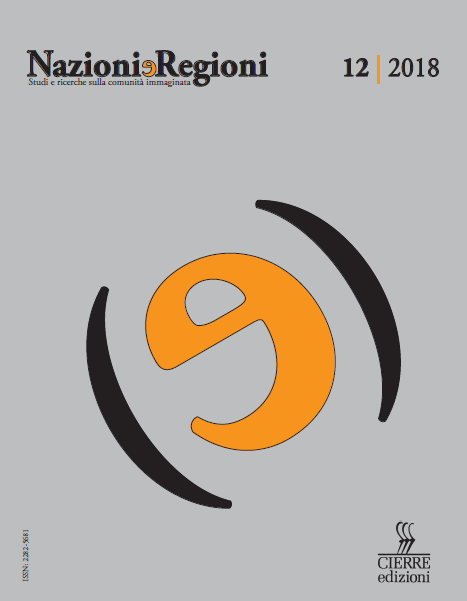L‟habitus “nazionale” israeliano: una banalizzazione a doppio taglio?<br><br>The israeli “national” habitus: a double-edged banalization?
DOI:
https://doi.org/10.15162/2282-5681/1483Parole chiave:
identità nazionale, habitus, unità di sopravvivenza, banalizzazione, Israele, national identity, survival unit, banalization, IsraelAbstract
L’identità nazionale è tra i temi più trasversali della ricerca sociale e politica, eppure rimane ambiguo. La resistenza dello stato-nazione, in quanto principale unità sociopolitica collettivizzante, solleva interrogativi sulle tendenze che vengono interiorizzate dal primo e che assicurano la sua resistenza nel tempo e nello spazio. Questo articolo discute l'identità nazionale mettendola in relazione con lo stato-nazione e tali tendenze: «habitus» e «unità di sopravvivenza», in quanto quest’ultima costruisce una collettività nazionale permanente. Lo studio chiarisce questa “relazione dialettica a doppio senso” affrontando il caso israeliano e la “banalizzazione nazionale” che presenta.
National identity is amongst the most transversal objects of social and political research. Yet it remains ambiguous. The resistance of the nation-state as the main collectivizing sociopolitical unit raises questions regarding the dispositions that are interiorized by the former and which ensures its endurance in time and space. This paper discusses national identity by putting it in relation with the nation-state and the dispositions: «habitus» and «survival unit», as the latter construct a lasting national collectivity. The paper clarifies this dialectical “two-way relationship” by addressing the Israeli case and the “national banalization” it presents.
Riferimenti bibliografici
Almog O. (2000), The Sabra: The Creation of the New Jew, University of California Press, Berkeley CA.
Anderson B. R. O’G. (1991), Imagined Communities: Reflections on the Origin and Spread of Nationalism, Verso London.
Banti A. M. (2011), Sublime madre nostra. La nazione italiana dal Risorgimento al Fascismo, Laterza, Roma-Bari.
Allouche J. (2003), The Oriental Communities in Israel, 1948-2003: The Social and Cultural Creation of an Ethnic-political Group 1948-2003, Graduate Institute of International Studies, Geneva.
Bareli A. (2009), «Mapai and the Oriental Jewish Question in the Early Years of the State», Jewish Social Studies: History, Culture, Society, vol. 16, n. 1 (Fall), pp. 54-84.
Bareli A. – Kedar N. (2011), Mamlakhtyiut Israelit [“Israeli Republicanism”], Policy Paper 87 (February), The Israel Democracy Institute, Jerusalem.
Bauman Z. (2000), Liquid Modernity, Polity, Cambridge.
Ben-Amos A. (ed.) (2002), History, Identity and Memory: Images of the Past in Israeli Education, Tel-Aviv University Press/Ramot Publisher, Tel Aviv.
Billig M. (1995), Banal Nationalism, Sage, London-Thousand Oaks.
Bligh A. (2013), «Political Trends in the Israeli Arab Population and its Vote in Parliamentary Elections», Israel Affairs, vol. 19, n. 1, pp. 201-219.
Bourdieu P. (1984), Distinction: A Social Critique of the Judgement of Taste, Harvard University Press, Cambridge MA.
Bourdieu P. – Wacquant L. J. D. (1992), An Invitation to Reflexive Sociology, Chicago University Press/ Polity Press, Cambridge.
Bourdieu P. (1998), Practical Reason: On the Theory of Action, Stanford University Press, Stanford.
Brown W. (2010), Walled States, Waning Sovereignty, Zone Books New York.
Canovan M. (1999), «Trust the People! Populism and the Two Faces of Democracy», Political Studies, vol. 47, n. 1, March, pp.2-16.
Douglas M. (1995), «Forgotten Knowledge» in Strathern M. (ed.), Shifting Contexts: Transformations in Anthropological Knowledge, Routledge, London-New York, pp. 13–29.
Elias N. (2000), The Civilizing Process. Sociogenetic and Psychogenetic Investigations, Blackwell, Oxford [1994].
Elias N. (2001), Society of Individuals, Continuum, London-New York.
Even-Shoshan A. (1987), The New Comprehensive Hebrew-Hebrew Dictionary, Kiryat Sefer, Jerusalem.
Fonzo E. (2013), «Scrivere la Storia in Israele. I “nuovi storici” e la nascita dello Stato ebraico», Ricerche di Storia Sociale e Religiosa, n. 83, Gennaio-Giugno, Anno XLI, Nuova Serie, pp. 231-264.
Ghanem A. (2010), Ethnic Politics in Israel: The Margins and the Ashkenazi Center, Routledge, Abingdon-New York.
Goodman Y. – Loss J. (2009), «The Other as Brother: Nation-Building and Ethnic Ambivalence in Early Jewish-Israeli Anthropology», Anthropological Quarterly, vol. 82, n. 2, pp. 477-508.
Gorny Y. (2015), Men of Here and Now: The Utopic Realism the Shapers of the New Jewish Society in Eretz Israel, Ben-Gurion University/Ben-Gurion Institute, Sde Boker-Beer Sheva.
Gutwein D. (2001), «Left and Right Post‐Zionism and the Privatization of Israeli Collective Memory», Journal of Israeli History, vol. 20, n. 2-3, pp. 9-42.
Gutwein D. (2009), «The Privatization of the Holocaust: Memory, Historiography, and Politics», Israel Studies, vol. 14, n. 1 (Spring).
Hobsbawm E. J. – Ranger T. (eds.) (1983), The Invention of Tradition, Cambridge University Press, Cambridge-New York.
Kaspersen L. B – Gabriel N. (2008), «The Importance of Survival Units for Norbert Elias’s Figurational Perspective», Sociological Review, vol. 56, n. 3, pp. 370-387.
Kedar N. (2002), «Ben-Gurion’s Mamlakhtiyut: Etymological and Theoretical Roots», Israel Studies, vol. 7, n. 3, pp. 117-133.
Kedar N. (2008), «A Civilian Commander in Chief: Ben-Gurion’s Mamlakhtiyut, the Army and the Law», Israel Affairs, vol. 14, n. 2, pp. 202-217.
Kimmerling B. (2001), The Invention and Decline of Israeliness: State, Culture and Military in Israel, University of California Press, Los Angeles-Berkeley CA.
Kumarswamy P. R. (2017), «How Fortunes of Israeli Revisionist History Came to Be Reversed», Swarajya Magazine, special issue: Passage To Israel, June.
Lechte J. (2008), Fifty Key Contemporary Thinkers: From Structuralism to Post-Humanism, Routledge, London-New York.
Liebman C. S. – Don-Yehiya E. (1983), Civil Religion in Israel: Traditional Judaism and Political Culture in the Jewish State, University of California Press, Berkeley CA.
Lijphart A. (1969), «Consociational Democracy», World Politics, vol. 21, n. 10, pp. 207-225.
Lijphart A. (1977), Democracy in Plural Societies: A Comparative Exploration, Yale University Press, New Haven-London.
Lijphart A. (2008), Thinking about Democracy: Power Sharing and Majority Rule in Theory and Practice, Routledge, Abingdon-Oxon-New York.
Likhovski A. (2010), «Post-Post-Zionist Historiography», Israel Studies, vol. 15 n. 2, July, pp. 1-23.
Mastropaolo A. (2005), La mucca pazza della democrazia. Nuove destre, populismo, antipolitica, Bollati Boringhieri, Torino.
Mautner M. (2011), Law and the Culture of Israel, Oxford University Press, Oxford-New York.
McGarry J. – O’Leary B. (2004), The Northern Ireland Conflict: Consociational Engagements, Oxford University Press, Oxford-New York.
Mudde C. (2004), «The Populist Zeitgeist», Government and Opposition, vol. 39 n. 4, pp. 541-563.
Omer A. (2013), When Peace Is Not Enough: How the Israeli Peace Camp Thinks about Religion, Nationalism, and Justice, The University of Chicago Press, Chicago-London.
Oz A. (2017), Shalom LaCanayim, Keter, Jerusalem.
Perulli A. (2012), Norbert Elias: processi e parole della sociologia, Carocci, Roma.
Ram U. (1999), «The State of the Nation: Contemporary Challenges to Zionism in Israel», Constellations, vol. 6, n. 3, pp. 325-338.
Raz-Krakotzkin A. (1993-1994), Sovereignity within Exile [“Galut metoch Ribonut”], Teoria u’Bikoret, n .4 (Fall 1993), pp. 23-55; Teoria u’Bikoret n .5 (Fall 1994), pp.113-132.
Remotti F. (1996), Contro l’identità, Laterza, Roma-Bari.
Remotti F. (2010), L’ossessione identitaria, Laterza, Roma-Bari.
Shapira A. – Reinhartz J. (eds.) (1996), Essential Papers On Zionism, New York University Press, New York-London.
Shohat E. (1999), «The Invention of the Mizrahim», Journal of Palestine Studies, vol. 29, n. 1 (Autumn), pp. 5-20.
Strathern M. (1995), Shifting Contexts: Transformations in Anthropological Knowledge, Routledge, London- New York.
Thiesse A.-M. (1999), La Création des identités nationales : Europe XVIIIe – XIXe Siècle, Seuil, Paris.
Thiesse A.-M. (2000), «Des fictions créatrices : les identités nationales», Romantisme, n. 110. pp. 51-62.
Yair G. (1989), «Sectarian Trends in Modern Israel», in Abramson G. (ed.), The Blackwell Companion to Jewish Culture, Blackwell, Oxford, pp. 688-691.
Downloads
Pubblicato
Fascicolo
Sezione
Licenza
Nazioni e regioni è una rivista open access che applica la licenza Creative Commons CC BY-NC-ND 4.0 a tutti i contenuti pubblicati.
Nazioni e regioni is an open-access journal that applies the Creative Commons CC BY-NC-ND 4.0 licence to all published contents.







